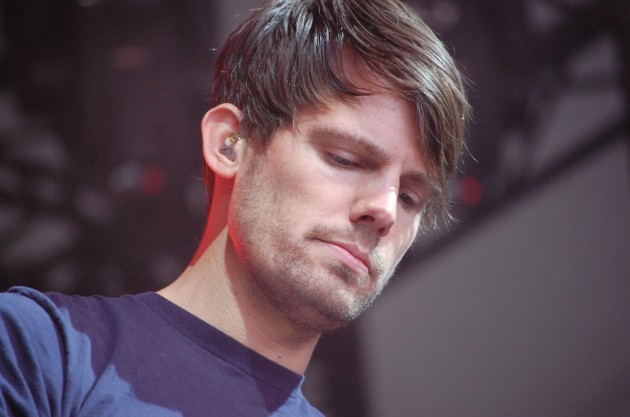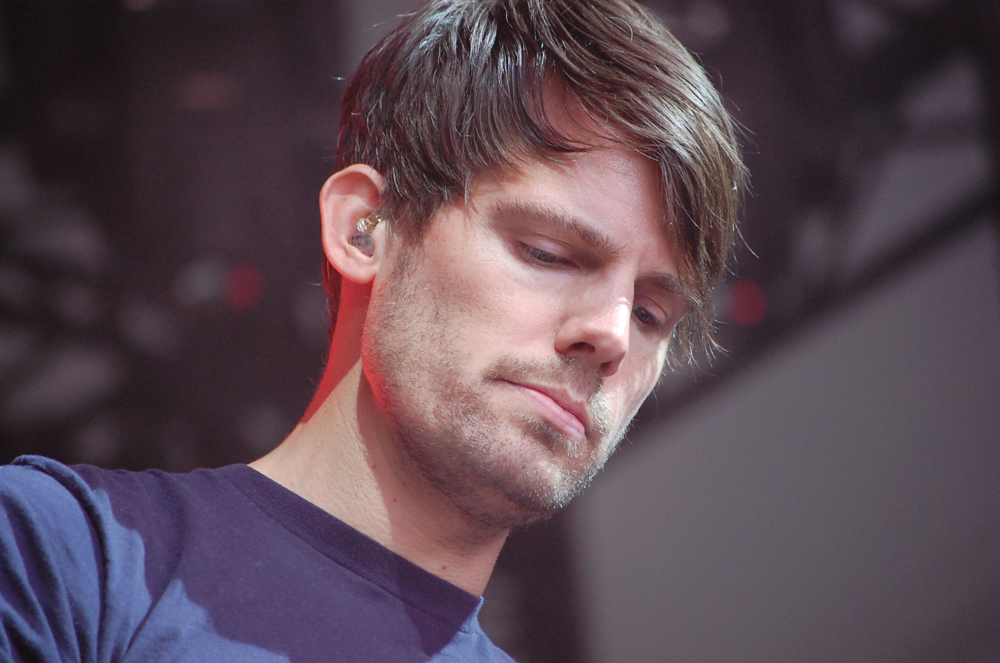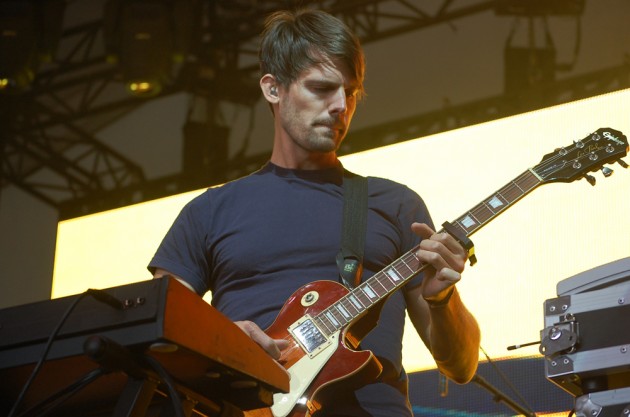
The calm, calculated producer of last year’s excellent Dive took some time to sit down with us at this year’s Sasquatch Festival. Better known as Tycho, Scott Hansen talks about preserving recording techniques, his longest tour yet, and what it means to be a self-taught musician.
Beats Per Minute (Erik Burg): The two mediums you work with, art and music, seem to be very intertwined. Does one primarily influence the other or do they sort of converge in a natural manner?
Tycho (Scott Hansen): At this point, they’ve kind of inadvertently become one and the same. For a while I saw them as these two distinct parts of the bigger puzzle. A while back I stopped doing design work for outside clients and since then things like ISO50 and the blog have sort of become their own thing but important nonetheless. In this case, the music came first and I was so focused on finishing the album and the then after I started worrying about the design. As I was recording I had things in my mind like ‘oh this will look that that’ or whatever, and then afterwords I began to piece those together.
BPM: There was a definite break in time between Past is Prologue, the Adrift 12″ and Dive. Was that something you did on purpose and did taking that time off really benefit you?
Tycho: You know, Past is Prologue is something strange because it wasn’t really planned out. It was like ‘here’s ten songs’ and I was sort of just messing around at that time and I put up the EP before that. Part of me felt like I didn’t have the skills, or I didn’t have the knowledge even though I had all these ideas. So I sort of drifted off into design land and kind of did that for a long time, and I started the blog and then I just got really busy. Then when I really found the time to make the music I had all this new material since then and all these bits and pieces where I could go ‘oh this is part of this thing’ that even though it was spread out it all needed to be together. It wasn’t on purpose but it had to be what it was for this record to happen. Now I feel like I can put all that to rest and move forward in maybe a more divergent way.
BPM: Most of your tours seem meticulously planned out and fairly short. What’s the reason behind not branching out on a typical nationwide tour?
Tycho: I’m really new to the touring thing. For a while I was just doing one-offs and then just recently put this band together. And the other thing is, this isn’t really my ‘job.’ I mean, it is now, but I still don’t like the idea of being gone for so long. I need to be in the studio to make things. Ultimately, it makes each tour special. For this one I’m on right now, it’s all new visuals. It gives me time to re-evaluate things. We are doing a month this summer which is going to be our longest yet, but then it’s nothing for a while because I have a lot of new material I need to get down.
BPM: What made you move from using a computer on stage, by yourself, to putting together a whole band and touring as such?
Tycho: By default a lot of electronic producers, and myself included for a long time, use a computer because it’s cost effective. In this sphere of music the resources are so small that the money isn’t there to have these big productions. It came about because I thought to myself ‘why am I playing these shows, why am I up there alone?’ I don’t feel comfortable with it and the way I was representing the music. It wasn’t something I would have enjoyed myself, I would have wanted to see how it was made. Most of it is made in very traditional way and not inside of a computer. So, if I worked that hard and created that whole album and if I was going to spend any amount of time on the road I wanted to do it right and just see where it goes. It sort of was like putting the cart before the horse but it worked out and people appreciate that.
BPM: Yeah, I always think it’s great when there’s a live band. It feels less like one person’s ideas being imposed unto you instead of a group of people coming together to create something. It’s more organic and triumphant.
Tycho: Yeah, the band has added so much. You know, we recorded the album set then we went back and remixed it for the live context. The rhythm section, the bass and the drums, we really drove those a lot harder. And those guys are really free to do their own thing and they’ve added their own embellishments. And after hearing feedback people think it just goes a littler harder and it’s been really positive.
BPM: The titles of the tracks on Dive are very succinct. Is there anything to that? Where you trying to capture the songs in one singular word or was that just pure happenstance?
Tycho: I think with the last album the titles were a little bit verbose. On Dive, I wanted to keep them short I didn’t want to go overboard. I didn’t want to force ideas down anybody’s throats like ‘this is what this track is supposed to mean’ but also at the same time I’m a graphic designer and the search for efficiency is important to me. Keeping things clean and tight, it’s just an extension of my other work. I had these working titles, and a lot of them were very long, and I had to think ‘what do these songs mean to me’ and just one word does the same function as the longer titles, so just working to make everything more efficient was important.
BPM: You’ve in past interviews about not wanted people to ascribe a temperature to your music, but do you think your music is meant to conjure certain colors?
Tycho: When I think of all the songs, I personally ascribe a sort of tonal spectrum to them and I think that the visuals are a great part of reinforcing that for the audience. But at the same time I don’t really want to force anybody to change how they think about them.
BPM: You make shirts, posters, ads that run in magazines. Physical pieces of art or copy that many people cherish. Is that something you’ve always wanted to carry over into your music as well, the ability to preserve it physically?
Tycho: For me it is. The ephemera of the music associated with my youth, it was definitely part of the experience. Those CD cases that went up the wall I had those all over the place and I had my dad’s vinyl. For me, my experience with consuming music is very grounded in the physical world and that’s just a function of my age and my generation. I can see why that’s a question that would be asked now, but for me it was never a question I asked myself it just came naturally for me. Ghostly in particular is a label that appreciates the tactile nature of having things in front of you, being able to ascribe what you’re listening to unto a physical thing. It makes it more real, it makes it more substantial.
BPM: When I’ve written about your music in the past I’ve always talked about it being a function of the computer and electronic generation, yet remaining completely timeless in execution. Is there a certain generation of music or time period that has influence you more than others?
Tycho: For a lot of producers I think the holy grail is the 70’s. Technology and technique, there was this certain high point and then digital came in and it solved a lot of problems and it afforded a lot more things in the way of power and the ability to pull things off in a timely manor. I think transformer based tapes and all those sort of things, I think there’s truth to the harmonics in all that. So I try and maintain this sort of 70’s recording path, and the only thing the computer is used for is editing. I try and do destructive recording through real tape when possible.
BPM: You’re a self-taught musician. Does that mean you’re always trying out new things or have you figured out by now what works and you’re trying to stick to those certain things?
Tycho: I started feeling safe with the keyboard. And then just naturally I started picking up the guitar and I started playing it. There’s this dogma, at least for me, like, I was getting stuck in ruts on the keyboard. It’s visual on the keyboard, you’re looking right at it. The guitar is more of a ‘feel’ sort of thing, at least for me. I can’t look at a guitar and know where the notes are or tell you ‘that’s this chord’ so it’s super experimental for me. That’s what made this album possible, it’s almost all written on guitar. So yeah, I think I’ll be a lifelong student of the guitar from now on because it’s such a difficult instrument for me. It’s constantly forcing me to do new things.
Tycho Summer 2012 Tour
6.25 Reno, NV – The Knitting Factory
6.27 Salt Lake City, UT – Urban Lounge
6.28 Fort Collins, CO – Aggie Theater
6.29 Denver, CO – Summit Music Hall
6.30 Colorado Springs, CO – The Black Sheep
7.2 Lawrence, KS – Granda
7.3 St. Louis, MO – Plush
7.5 Minneapolis, MN – Varsity Theater
7.6 Chicago, IL – Lincoln Hall
7.7 Pontiac, MI – The Crofoot Ballroom
7.8 Cleveland, OH – Beachland Ballroom
7.10 Toronto, Canada – The Hoxton
7.11 Montreal, Canada – La Sala Rossa
7.13 Pattersonville, NY – Camp Bisco
7.14 New York, NY – Webster Hall


